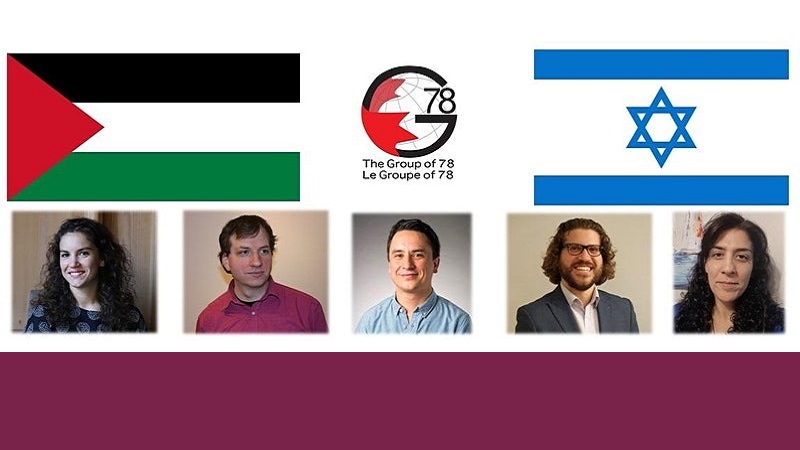Israel and Palestine: Future Directions in the Middle East
Starts on Wed, Jan 13, 2021, 12 noon Eastern Standard Time (UTC-5)
Tickets here.
Specialists will provide analysis of the politics of the Middle East, political currents in IL, and CA relationship with the peace process.
The resource-rich Middle East and North Africa region is at a nadir following two tumultuous decades of localised crises, regional power struggles and interventions from abroad. Multiple shattered states and societies, from Libya to Syria, Yemen and Iraq, lie in their wake. Yet, one contested region, Israel and Palestine, remains central to regional peace and stability. It remains in as regressive and dangerous a state as ever, too.
This online seminar will explore the regional outlook of Israel, Palestine and the broader Middle East. It takes into consideration four years of the Trump administration siding firmly with the Netanyahu government in Israel, including support for de jure annexation of further Palestinian land.
It also offers insight onto peace agreements signed between Israel and Arab states, for the first time since 1994; the further deterioration of Palestinian well-being, which includes de facto West Bank land annexations and dystopian life conditions in Gaza; and Canada’s own current policy, which such as includes renewing funding to Palestinian refugees and voting at the UN for the Palestinian right to self-determination while simultaneously voting against nearly every other Palestinian resolution and facilitating the sale of Israeli settlement goods in Canada. This forms the backdrop of this panel.
This holiday season, give to:
Truth and understanding
The Media Line's intrepid correspondents are in Israel, Gaza, Lebanon, Syria and Pakistan providing first-person reporting.
They all said they cover it.
We see it.
We report with just one agenda: the truth.


Our panel of regional specialists will provide their analysis through an update on the politics of the Middle East (Dr Alaa Tartir), political trends and life in the Occupied Palestinian Territory (Inès Abdel Razek), political currents in Israel (Dr Shir Hever), and Canada’s relationship with the Palestinians and Middle East Peace Process (Dr Jeremy Wildeman).
Bios
Dr. Alaa Tartir is a Researcher and Academic Coordinator at the Graduate Institute of International and Development Studies in Geneva, a Global Fellow at The Peace Research Institute Oslo (PRIO), and Program and Policy Advisor to Al-Shabaka, the Palestinian Policy Network. Tartir is the co-editor of Palestine and Rule of Power: Local Dissent vs. International Governance (Palgrave Macmillan, 2019), and the co-editor of Political Economy of Palestine: Critical, Interdisciplinary, and Decolonial Perspectives (Palgrave Macmillan, 2021). Tartir’s publications can be accessed at www.alaatartir.com, and he tweets at @alaatartir.
Inès Abdel Razek is the Advocacy Director of the Palestine Institute for Public Diplomacy, A Palestinian independent organization based in Ramallah. Prior to joining the PIPD in 2019, Inès has held advisory positions to high-level diplomats and officials of the Union for the Mediterranean in Barcelona, the UN Environment Programme in Nairobi and the Palestinian Prime Minister’s Office in Ramallah, mainly working on multilateral governance and development cooperation policies. Inès is also a policy member at the think-tank Al-Shabaka and an Advisory board member of the social enterprise BuildPalestine. Inès holds a Master’s degree in Public Affairs from Sciences-Po, Paris. Twitter: @InesAbdelrazek
Dr. Shir Hever is an independent economic researcher and journalist. He is currently living in Germany, and is a graduate of the Freie Universität in Berlin. His second book: Privatization of Security in Israel, was published by Pluto Press in 2017.
Dr Jeremy Wildeman is a research analyst of global and Middle East politics, human security and “development” aid. His specialisations include the impact of foreign aid/intervention on the Palestinians, and Canada’s relationship with the Middle East. Since 2010, he has explored in-depth (at the universities of Exeter, Bath and Ottawa) the humanitarian, development, security and peacebuilding nexus of foreign aid in the Occupied Palestinian Territory. These resulted in numerous peer-reviewed publications and policy analysis. He has published several major works on Canada’s relationship with the Palestinians, too. His scholarly work is supported by extensive field experience delivering humanitarian and development aid in the city of Nablus (from 2002 to 11), and afterward in multiple regions in crisis in the Middle East and Balkans. He is also a Fellow with HRREC-CREDP at the University of Ottawa and his Twitter is @jeremywildeman
Dr. Ruby Dagher has studied and taught at both Carleton and Ottawa Universities and is currently an Adjunct Professor in the School of International Development and Global Studies, University of Ottawa. Ms. Dagher has worked and consulted with the Canadian International Development Agency, the Caribbean Development Bank, the University of Central Asia, and Global Affairs Canada. She has a doctorate in Public Policy and Administration Development from Carleton University and is the recipient of numerous awards and scholarships. She is trilingual in English, French and Arabic.
Ms. Dagher has written widely in books, journals and newspapers, has presented in many media broadcasts and has organized and moderated many conferences, workshops and panels. Among her academic and personal interests are international development and its many dimensions, Middle East politics, conflict, social movements and power relations.
If you would like to contribute to support our ongoing activities any contribution $20 or over will be provided with a charitable tax receipt. Thank you for your support and participation.

